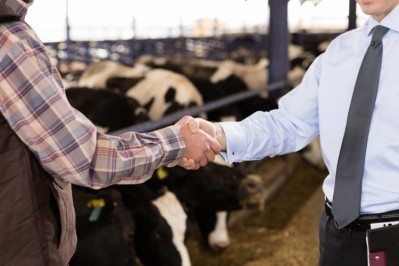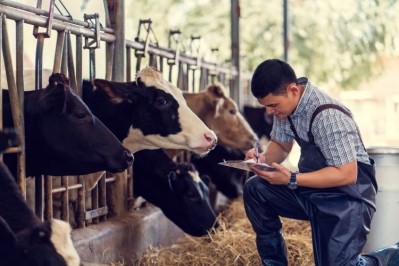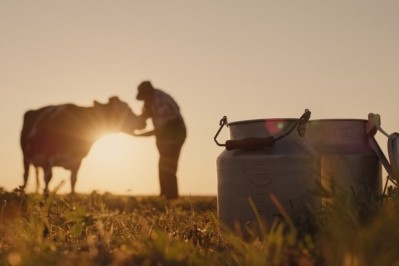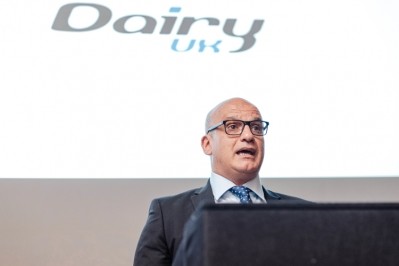Who should support dairy farmers in transitioning to ethical farming systems?
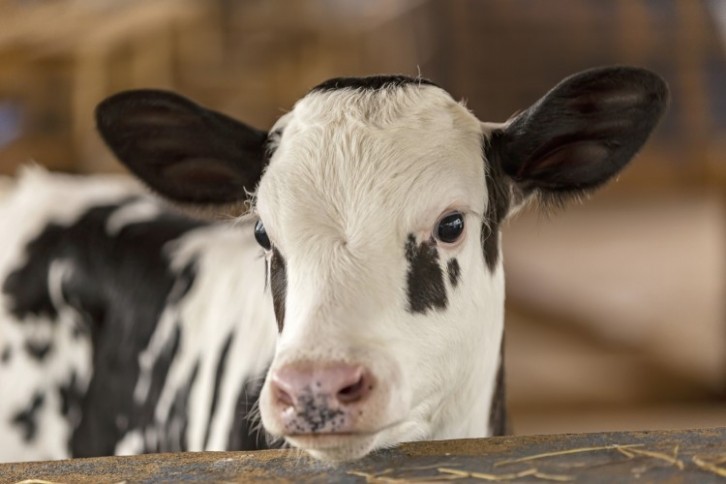
The report was published by the Food Ethics Council, a British think tank specializing in ethical food issues and sustainability in food and farming.
The release of the 36-page document follows a two-year project that involved workshops and conversations between the think tank and dairy sector stakeholders, including milk buyers, processors and retailers, with a focus on understanding farmers’ aspirations for, and barriers to, transitioning to farming systems perceived as more ethical – such as calf-at-foot, organic or regenerative.
The report shares actions that can support this change across the entire value chain, with a key focus on processors and retailers, who are viewed as having the greatest influence in the matter.
During the project, the think tank identified the tension of balancing the running of a profitable dairy business with responsibilities towards the environment, the animals’ welfare, and the farmers’ own wellbeing as the main barrier to change.
According to the organization’s Tesni Clare, many farmers “feel trapped in a system that rewards them for volume-based production rather than value-based products created in line with their - and societies’ – values”.
“We think of this as a treadmill,” she opened. “Over time, dairy farmers have had to invest in infrastructure in order to keep pace with what the sector demands of them.
“We are now in a situation where many farmers would like to make changes to the way they farm, but they are locked in financially with large debts and potentially stranded assets.”
Dairy farmers have long operated on narrow profit margins; to many, it’s the nature of the beast. But enabling a transition to different farming systems would require action from the whole agri-food chain; from processors and retailers to consumers and the government.
“There is a need to both incentivise nature-friendly farming with an assured market and fair prices, whilst also financially supporting farmers during the transition phase,” Clare explained. “Even if farmers can make a profitable business from more environmentally friendly practices, there is flexibility needed in the interim transition phase. This is a significant barrier of change at the moment.”
Fixing the balance of power
One area of improvement lies with transparency at retail level. Clare says that retailers face pressures to keep prices low due to competition, while there’s little visibility of different milk production systems such as pasture-fed and calf-at-foot. At consumer level, milk is still one of the most wasted products in the UK, with 300,000 tons tipped down the drain each year.
“The societal perception of milk is broken, with the true cost of production rarely represented on supermarket shelves,” Clare explained. “We have seen a ‘race to the bottom’ in the last decade, with milk now often sold as a loss leading product. There may be a need for the government to regulate around loss leaders and pricing below the cost of production, to help retailers that would like to stop loss leading but currently struggle to make the first move due to competition.”
She added that underpinning all these challenges is “a deep imbalance of power - enabled by unfair contracts - between farmers, processors and retailers, leading to a lack of trust, poor communication and a disproportionate spread of risk across the sector”.
This paints a rather bleak picture of the industry – how much of a disconnect does the think tank see across UK dairy? Well, it’s not all bad, Clare suggested. “There are certainly different experiences across the sector with regards to relationships between producers and buyers.
“However, many farmers we spoke to felt that there was a lack of understanding, particularly from retailers, about the barriers and challenges they were facing in making changes to their practices. Years of poor communication across the value chain have led to mistrust and many farmers feel that they do not trust their buyers to commit to helping them through the transition required of the sector. Saying this,
we did approach processors particularly regarding exclusivity in contracts, and were told that there does tend to be flexibility if farmers were to approach and enquire. This highlighted to us the real need to encourage space for open dialogue.
“Unfortunately, due to limited access to contracts - there may only be one of two processors in a certain geographical area - the fear farmers face in potentially losing their contract is very real and has led to some feeling unable to speak up for fear of being ‘labelled as difficult’ or even having a ‘red mark put beside their name’.”
At the same time, there are areas where stakeholders align on, such as the collective desire to improve the sector’s environmental sustainability, animal welfare record, and encourage a new generation of farmers to alleviate the labor shortages. “However, defining whose responsibility it is to make changes is contentious and has sometimes led to lack of action,” Clare added.
Farmers’ willingness to change varies
But what do farmers think of transitioning to different farming systems? Clare said that experiences, values and perspectives ‘vary greatly’ – in general, new entrants are more open to less conventional ways of farming, such as operating calf-at-foot systems or setting up micro dairies with doorstep deliveries. “But new entrants are often free to explore these types of business models as they are not locked into more conventional models due to historical debt,” she said.
“We did also find that some of the farms that made the most radical changes to their systems had been significantly influenced by people who weren’t from a farming or dairy background, and were therefore new, curious and at times critical of the sector.
“With those who have been in dairy for a long time, there can be an unwillingness to question the status quo and look at the business beyond purely the ability to make profit, nor question how they could make their business align with their values and preferred lifestyles.”
“There is a definite need for a mindset shift in the dairy sector, but we are seeing this slowly happening. At farm level, family pressures to farm in a certain way or fear of being judged by your peers or neighbours was noted as impacting farmers’ confidence to make changes.”
The Food Ethics Council did find that most farmers it engaged with had been interested in or already adopting either regenerative, organic or agroecological practices on their farms. “Farmers more often than not see themselves as custodians of the land in which they farm and as such do have a desire to ‘do the best’ for the land and their animals,” Clare told us. “To what extent farmers are willing to take the financial risk in transitioning does vary, but we would say that farmers' willingness to make changes versus their ability to make changes within the current system are not the same thing.”
Improving regulation
The report highlights that the crucial role of local and national government when it comes to enforcement – but how effective are the current levers in enforcing positive actions, particularly from the most powerful players in the value chain?
“Current levers aren't effective,” Tesni Clare said. “There are a number of processors that have signed up for the Voluntary Code of Practice for the dairy sector, however there is a need for a new statutory code of conduct to place processors on a level playing field. We know voluntary alternatives to regulation are less likely to work."
The think tank also calls on the UK government to extend the remit of the Groceries Code Adjudicator to include major foodservice players and processors and manufacturers and farmers. Retailers can currently be fined for unfair trading practices, but Clare says it’s a power rarely used.
So what of the new regulations on supply contracts that the UK government is planning to introduce? The measure was hailed by the industry as a step towards increasing fairness and transparency in the dairy supply chain and addressing concerns around exclusivity and pricing. This statutory code ‘must be robustly enforced’ when it is introduced, Clare said.
“There is currently a tension between getting the code published - the process has been ongoing for 4 years now - whilst also making sure that the code will actually result in significant changes for farmers. Issues around exclusivity in contracts, notice given for milk price changes and notice required to leave contracts are all important issues that should be addressed in the new code. This code will set a precedent for other farming sector codes, therefore there is an even greater need to ‘get this right’.”
When asked how processors could make milk pricing more transparent now, Clare explained that price reporting and tracking could be improved.
“It is well known across the sector that dairy is behind with regards to price tracking and price predictions,” she stated. “This can make business planning very difficult not only for farmers but others in the supply chain as well.
“Price reporting would support the delivery of volatility management mechanisms and improve resilience within farmers by providing the transparency and intelligence necessary to better manage their systems and output. Otherwise, the perishability of milk production can make this extremely hard.”
The new code would also introduce clearer pricing terms by requiring contracts to set out the factors which generate the milk price and allowing farmers to challenge prices if they feel this process isn’t being followed – a ‘major advance in transparency’, as Clare put it.
Incentivizing farmers: Would passing down premiums actually work?
Another of the report’s recommendations suggests passing down premiums from processors to farmers through higher farmgate payments. The think tank argues that organic premiums in the UK are only 5p higher than conventional milk compared to previous years, which has seen some organic dairies convert back to conventional. But would processors realistically agree to adopt such measures, we asked; would it be fair?
“Is it fair that a retailer profits exponentially from a product that farmers have had to spend extra money to produce?” Clare said. “We would argue that passing premiums on to farmers to be better reflected in farmgate prices is not only the right thing to do but will encourage farmers to transition/continue farming in this way.”
Andrew Opie, director of Food and Sustainability at the British Retail Consortium, a trade body that represents UK retailers, responded: “Retailers enjoy strong relationships with dairy farmers and already pay premiums for ‘ethical’ dairy products. Consumers can make their own choice about whether they wish to pay more for these products, which are clearly labeled in line with regulations.”
The Food Ethics Council’s report can be accessed freely via the organization’s website.
